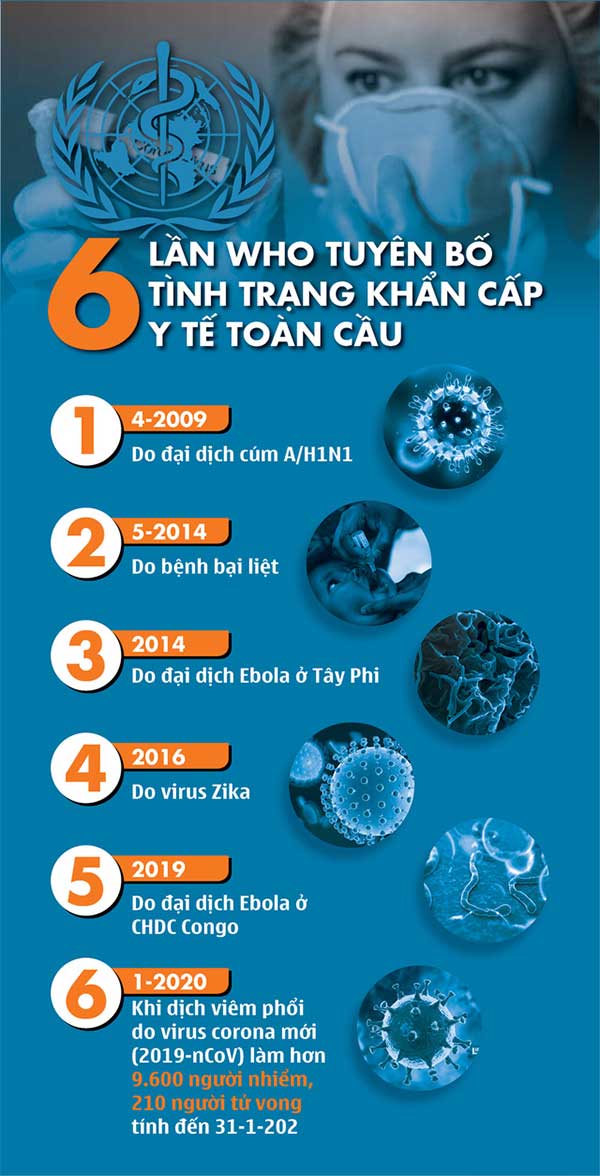What is a global medical emergency?
The International Public Health Emergency (PHEIC) was declared by WHO in the face of a global crisis affecting public health.
PHEIC is defined by the World Health Organization (WHO) as an "anomalous event", "which constitutes a health threat to countries through the spread of international disease ", asking "coordinated response" from many countries.
In theory, PHEIC is not legal, WHO still has the right to make recommendations for activities that can spread disease quickly such as restricting tourism and trade.

According to Professor Rebecca Katz, Director of the Center for Global Health Science and Safety, Georgetown University, the emergency creates significant pressure on bound member states. In addition, WHO can mobilize international cooperation, from human resources to finance.
By emphasizing the dangers of the disease, emergencies help persuade nationals to follow health and hygiene recommendations. During this pandemic, the WHO introduced measures to prevent infection including washing hands with soap and germicidal water; avoid contact with people with flu symptoms; Eat cooked boiled and not close to wildlife.
The WHO Emergency Committee also reserves the right to recommend travel advice to cities, regions and countries. This right was applied in the 2003 SARS epidemic.
PHEIC also has implications for airlines, which transport passengers in and out of Chinese territory. In some cases, it was not until the WHO statement was issued that airlines were reluctant to cancel flights because they contributed a large part of the company's profits.
WHO may consider public health measures applied by countries to its visitors. If a country places a travel or trade restriction order beyond its recommendations (such as refusing entry), WHO has the right to ask the government to present relevant scientific evidence.
So far, WHO has declared the global emergency medical 5 times .
PHEIC was first announced during the 2009 H1N1 Swine Flu pandemic, currently, the pandemic is still in its third stage.
In 2014, the World Health Organization recognized the Ebola epidemic in Africa and the rise of polio was an emergency.
In February 2016, WHO declared PHEIC for Zika in the United States.
The strange pneumonia from coronavirus with the nCoV strain became the 6th emergency in world medical history. On January 30, at a meeting in Geneva, Switzerland, the WHO declared the pneumonia epidemic from the nCoV corona virus as a public health emergency, also known as a Public Health Emergency. International (PHEIC).
The number of deaths due to pneumonia associated with the nCoV strain of corna reached a record high, reaching 213 cases on January 31.
Of the 42 reported new deaths, 30 live in the Wuhan outbreak. So far, there have been no deaths outside of China. The country also recorded 9,356 new cases in all 31 provinces, bringing the total number of nCoV-positive patients globally to 9,480, far exceeding the SARS pandemic of 2002-2003.
More than 32,000 people are under isolation and more than 200 patients are in critical condition.
- Notes on prevention and protection of Corona virus
- How to directly update the situation of Wuhan virus
- Australia recreates Wuhan virus, a breakthrough to help develop vaccine
- Many people are confused about Wuhan virus and Corona beer
- How to distinguish corona virus and common cold
- WHO declares the corona virus outbreak as a global emergency
- WHO announces the global emergency of Ebola
- Rescue astronauts in the universe
- Watson supercomputers help synthesize medical information faster
- Flu pandemic spread, New York announced an emergency medical condition
- Standard ambulance bag for the World Cup
- Global warming is very urgent
- 11,000 scientists warn of a global climate emergency
- First aid when there is no medical device
- Car glass smashes in an emergency situation is more difficult than you think
- eCall - emergency telephone on passenger car
- 225 new drugs were invented and used in the next 5 years
 13 causes of non-itchy rash
13 causes of non-itchy rash How the mouse with human ears changed the world?
How the mouse with human ears changed the world? The truth about 'fried rice syndrome!
The truth about 'fried rice syndrome! What is dental implant?
What is dental implant?